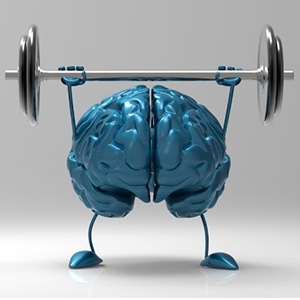Making "Brain Health" a Habit
 “What did you do today to train your brain?” is a question Dr. Selena Bartlett—neuroscientist,
professor, podcaster, and author—thinks should be asked as part of every dinner conversation.
You know, the way we ask about what a spouse did at work, or our children did at school,
or if a diet or an exercise program is helping someone lose weight and feel better.
“What did you do today to train your brain?” is a question Dr. Selena Bartlett—neuroscientist,
professor, podcaster, and author—thinks should be asked as part of every dinner conversation.
You know, the way we ask about what a spouse did at work, or our children did at school,
or if a diet or an exercise program is helping someone lose weight and feel better.
I’ve always loved science, but I became passionately interested in brain science and brain health when my husband was diagnosed with Alzheimer’s disease in 2015. A lot has been learned about the brain in the past decade, and now there is something of a “brain health revolution” taking place.
As recently as the 90s, neurologists told us that our brains reached their peak at about age 25, and then we would gradually lose brain function until we died. Now The Brain Health Project and other research is telling us that “Too many of us are outliving our brains, and that doesn’t have to be the case.” There is a new category of health, “brain health.” We can look at it as a new type of fitness that is needed to help us and our brains cope with the rate of change occurring all around us and to live longer with our brains intact.
How scientists think the brain works has fundamentally changed. In her Brain Health lecture “How to Have a Thriving Mind,” Dr. Bartlett explains the neuroplasticity of the brain, how its ability to function is not fixed, and how it can be thought of as a muscle that can be trained and improved over the course of our entire lives. We can do something about it!
So how do we boost brain power? Dr. Bartlett suggests that we start by developing a new and relatively simple morning routine. If find we can do that, we will realize we can do other things we thought we couldn’t do:
- First, when you wakeup, don’t grab your phone. Look out the window. Panoramic vision opens the visual nervous system. (This isn’t working for me right now because when I wake up at 6:00, it’s dark outside. I’m trying to look around the room instead.)
- Next, think of three things you are grateful for, or switch it up by thinking of three reasons people have said they are grateful for you. This can help you to expand your thinking beyond your daily concerns.
- The third is a little more challenging: Take a cold shower. What?! She convinced me I should try it by explaining that, among other things it:
- helps to tap into our resilience and see how strong we are,
- produces endorphins—a natural pain reliever—and can change our response to pain and cold for the better (I’ve always been very sensitive to cold),
- changes the alkalinity in our blood and wakes up our immune system.
 I can do it—almost! As Dr. Bartlett suggested, I started trying to develop a cold shower habit by first standing in the cold spray just from the knees down for a quick 10 seconds. After a couple of days of that, I took a deep breath and
turned my whole back to the water. I discovered that after a full 10 seconds the water started to
seem less cold. Over about 2 weeks, I’ve worked my way up to 45 seconds on each side
and 5 seconds of turning around and gradually and getting my face wet.
I can do it—almost! As Dr. Bartlett suggested, I started trying to develop a cold shower habit by first standing in the cold spray just from the knees down for a quick 10 seconds. After a couple of days of that, I took a deep breath and
turned my whole back to the water. I discovered that after a full 10 seconds the water started to
seem less cold. Over about 2 weeks, I’ve worked my way up to 45 seconds on each side
and 5 seconds of turning around and gradually and getting my face wet.
What keeps me going is that when I turn off the cold water,I feel amazing—more alert and energized, happier and more self-confident. I’m not shivering. Any aches or pains may not be gone but they hurt less, at least for a while.I still start with a warm shower for the soap and shampoo part, but I actually look forward to the cold water to come—well, at least to how I know I’ll feel after the water is off. My goal is to be able to take my whole shower in cold water. Think it sounds crazy? I challenge you to try it!
The scientists used to say that you had to do something big like learn a new language or how to play an instrument to improve your brain power. Now they’re saying that all new things we try to do, if we makethem a habit, cancreate new connections in our brains. Studies show thatmany people who live to be over 100 are still doing something different all the time and not just living but thriving.
Here are a few other things Dr. Bartlett suggests that can improve our brain fitness:
- Get enough sleep, 7-9 hours.
- Take 5-minute breaks; go outside in nature.
- Reduce sugar intake. It’s an addiction that affects the same brain receptors as alcohol.
- Use stress relieving strategies to positively affect blood flow to the brain and executive function. It’s stress that drives you to addictions.
- Be curious: listen to podcasts, read, ask lots of questions.
- Practice writing with your left (non-dominant) hand.
- Be social. When it’s stressful to be with people you can change. Start with a call or text.
According to the new brain science, we can impower ourselves to be the architects of our brains. Avoid falling into the trap of thinking “That’s just the way I am.” Neuroplasticity is a real thing. If you really want to thrive throughout your lifetime, see life as a challenge and think, “I actually can do that; I just didn’t think I could.” I’m trying—one cold shower at a time.
Want to Learn More? Check Out these Sources:
BrainHealth Lunchtime Lectures
Brain & Life Magazine; Neurology for Everyday Living – print copy, website
Website Being Patient: The latest news on Alzheimer’s disease and brain health research
Salt Lake County Aging & Adult Services
Alzheimer's Association, www.alz.org
Books:
Smashing Mindset, Train your Brain to Reboot, Recharge, Reinvent Your Life, by Dr. Selena Bartlett
Mindset: Changing the way you think to fulfil your potential, by Dr. Carol S. Dweck
Remember: The Science of Memory and the Art of Forgetting, by Lisa Genova
